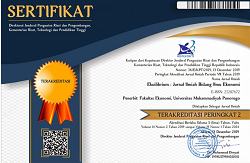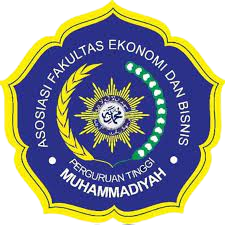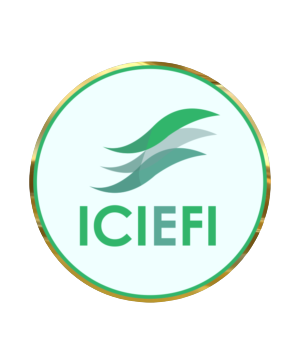How does the PEN Program Affect the Sustainability of MSMEs: A Case Study in Bantul
DOI: 10.24269/ekuilibrium.v18i1.2023.pp110-119
Abstract
The Indonesian economy has faced a pandemic for the last two years. The Covid-19 pandemic is the starting point for implementing digital technology for MSMEs. MSMEs and the government maintain the sustainability of MSMEs, which are one of the pillars of the economy. This study aims to analyze the impact of digital technology implementation, human capital and PEN program in maintaining business sustainability directly or through competitive advantage. The object of research is culinary MSMEs in Bantul Yogyakarta Regency. SEM PLS is employed to estimate the primary data by using WARPS PLS 6.0 application. The results revealed that digital technology variables could directly affect business sustainability. Meanwhile, human capital and the PEN program affect business sustainability through competitive advantage. The results suggest government extend the fiscal stimulus.
Keywords
References
- Ahmad, N. N. (2020). The Effectiveness of Additional PRIHATIN SME Economic Stimulus Package ( PRIHATIN SME +) in Malaysia Post-COVID-19 Outbreak : A Conceptual Paper. Global Business & Management Research: An International Journal, 12(4), 754–764. Retrieved from http://gbmrjournal.com/pdf/v12n4/V12N4-73.pdf
- Ahmedova, S. (2015). Factors for Increasing the Competitiveness of Small and Medium- Sized Enterprises (SMEs) in Bulgaria. Procedia - Social and Behavioral Sciences, 195, 1104–1112. https://doi.org/10.1016/j.sbspro.2015.06.155
- Ardhi, M. (2021). Optimizing the Marketing of MSMEs Products Through Digital-Based E-UMKM Applications During the Covid-19 Pandemic as a Strategy to Improve the Indonesian Economy in Rempek Village, North Lombok. Abdipsikonomi, 2(4).
- Asare, R., Akuffobea, M., Quaye, W., & Atta-Antwi, K. (2015). Characteristics of micro, small and medium enterprises in Ghana: Gender and implications for economic growth. African Journal of Science, Technology, Innovation and Development, 7(1), 26–35. https://doi.org/10.1080/20421338.2014.979651
- Azzahra, H., Marditama, T., Fithriani, M., & Febriyani, V. (2021). Post-Covid-19 Pandemic Digital Innovation Trends in Start-Up Entrepreneurial Sustainability in Indonesia. Journal Science Innovation and Technology (SINTECH), 2(1), 6–14.
- Bartik, A. W., Bertrand, M., Cullen, Z. B., Glaeser, E. L., Luca, M., & Stanton, C. T. (2020). How Are Small Businesses Adjusting To Covid-19? National Bureau Of Economic Research 1050 Massachusetts Avenue Cambridge.
- Bonito, A., & Pais, C. (2018). The Macroeconomic Determinants Of The Adoption Of IFRS For Smes. Revista De Contabilidad-Spanish Accounting Review, 21(2), 116–127. https://doi.org/10.1016/j.rcsar.2018.03.001
- Budiarto, D. S., Vivianti, E., & Diansari, R. E. (2021). Maintaining the Performance and Sustainability of MSMEs with E-Commerce: Research during the Covid-19 Pandemic. Journal of Economics, Business, & Accountancy Ventura, 23(3). https://doi.org/10.14414/jebav.v23i3.2463
- Das, M., Rangarajan, K., & Dutta, G. (2020). Corporate sustainability in SMEs: an Asian perspective. Journal of Asia Business Studies, 14(1), 109–138. https://doi.org/10.1108/JABS-10-2017-0176
- Garzoni, A., Turi, I. De, & Secundo, G. (2020). Fostering digital transformation of SMEs: a four levels approach. Management Decision, 58(8). https://doi.org/10.1108/MD-07-2019-0939
- Hair, Joseph, Tomas Hult, Christian Ringle, and M. S. (2013). A Primer on Partial Least Squares Structural Equation Modeling. Long Range Planning, 46(1–2), 184–185. https://doi.org/10.1016/j.lrp.2013.01.002
- Hartono, J. (2011). Concepts and Applications of Structural Equation Modeling. Yogyakarta: UPP STIM YKPN.
- Haseeb, M., Hussain, H. I., Kot, S., Androniceanu, A., & Jermsittiparsert, K. (2019). Role of Social And Technological Challenges In Achieving A Sustainable Competitive Advantage And Sustainable Business Performance. Sustainability (Switzerland), 11(14). https://doi.org/10.3390/su11143811
- Kennedy, P. S. J. (2021). Management Journal. Fundamental Management Journal, 4(1), 37–51.
- Kock, N. (2018). Ned Kock - Collaborative For International Technology Studies. Advanced Mediating Effects Tests, Multi-Group Analyses, And Measurement Model Assessments in PLS-based SEM. International Journal of e-Collaboration, 10(3), 1-13.
- Kuckertz, A., Brändle, L., Gaudig, A., Hinderer, S., Morales Reyes, C. A., Prochotta, A., Steinbrink, K, Berger, E. S. C. (2020). Startups In Times Of Crisis – A Rapid Response To The COVID-19 Pandemic. Journal of Business Venturing Insights, 13(April). https://doi.org/10.1016/j.jbvi.2020.e00169
- Lesakova, L. (2014). Innovations In Small And Medium Enterprises In Slovakia. Acta Polytechnica Hungarica, 6(3), 23–34. https://doi.org/10.1016/j.sbspro.2013.12.849
- Limanseto, H. (2022). The Development of MSMEs as a Critical Engine of the National Economy Continues to Receive Government Support. Retrieved from https://www.ekon.go.id/publikasi/detail/4593/perkembangan-umkm-sebagai-critical-engine-perekonomian-nasional-terus-mendapatkan-dukungan-pemerintah
- Liu, E., & Sukmariningsih, R. M. (2021). Building a Basic Model for Using Digital Technology for MSMEs during the Covid-19 Pandemic. Jurnal Ius Constituendum, 6(1), 213. https://doi.org/10.26623/jic.v6i1.3191
- Lu, Y., Wu, J., Peng, J., & Lu, L. (2020). The Perceived Impact Of The Covid-19 Epidemic: Evidence From A Sample Of 4807 Smes In Sichuan Province, China. Environmental Hazards, 19(4), 323–340. https://doi.org/10.1080/17477891.2020.1763902
- M. Berndt, G. Muent, D. Revoltella, T. Bending, E. Calthrop, G. Dunnett, S. F., & M. Lundqvist, L. Piovesan, M. Scatasta, S. Stölting, T. V. (2016). Restoring EU competitiveness 2016 updated version. In European Investment Bank.
- Marginingsih, R. (2021). The National Economic Recovery Program as a Policy for Mitigating the Impact of the Covid-19 Pandemic in the MSME Sector. Moneter - Jurnal Akuntansi Dan Keuangan, 8(2), 110–116. https://doi.org/10.31294/moneter.v8i2.10997
- McAdam, M., McAdam, R., Dunn, A., & McCall, C. (2016). Regional Horizontal Networks within the SME Agri-Food Sector: An Innovation and Social Network Perspective. Regional Studies, 50(8), 1316–1329. https://doi.org/10.1080/00343404.2015.1007935
- Nasir, M. S., AK, M. L., Andriyani, N., Wibowo, A. R., & Oktaviani, Y. (2022). Credit Guarantee the National Economic Recovery Program (PEN) for MSMEs: A Case Study of MSMEs for Bank Pembangunan Daerah DIY. Ekuilibrium: Jurnal Ilmuah Bidang Ilmu Ekonomi, 17(2), 158–170. Retrieved from https://journal.umpo.ac.id/index.php/ekuilibrium/article/view/4855
- Nawarini, A. T., Widiastuti, E., Sulistyandari, S., & Indriati, S. (2018). Increasing The Business Performance Over Human Capital Contribution On Creative Industry In Banyumas Regency. Ekuilibrium : Jurnal Ilmiah Bidang Ilmu Ekonomi, 13(1), 11. https://doi.org/10.24269/ekuilibrium.v13i1.701
- Nugroho, M. A., Susilo, A. Z., Fajar, M. A., & Rahmawati, D. (2017). Exploratory Study of SMEs Technology Adoption Readiness Factors. Procedia Computer Science, 124, 329–336. https://doi.org/10.1016/j.procs.2017.12.162
- Okoh, J. I., Mac-Ozigbo, A., Onyemauche, O. J., & Aderemi, T. A. (2022). Assessment of the Impact of CBN Post COVID-19 Stimulus Packages on the Economic Sustainability of SMEs in the COVID-19 Epic Centres of Nigeria. The Journal of Accounting and Management, 12(2), 29–44.
- Omar, A. R. C., Ishak, S., & Jusoh, M. A. (2020). The impact of Covid-19 Movement Control Order on SMEs’ businesses and survival strategies. Geografia. core.ac.uk. Retrieved from https://core.ac.uk/download/pdf/356661500.pdf
- Putri, E., Praswati, A. N., Muna, N., & Sari, N. P. (2022). E-Finance Transformation: A Study of M-Wallet Adoption in Indonesia. Jurnal Ekonomi Pembangunan: Kajian Masalah Ekonomi Dan Pembangunan, 23(1), 123–134. https://doi.org/10.23917/jep.v23i1.15496
- Rahmadan, R., Indrawari, I., & Ridwan, E. (2021). The Influence of the Covid-19 Pandemic on the Impact of Digital Economy Implementation on MSMEs. Menara Ilmu, 15(1), 84–96. https://doi.org/10.31869/mi.v15i1.2384
- Rumetna, M. S., & Sembiring, I. (2017). Utilization of Cloud Computing for Small and Medium Enterprises (SMEs). Proceedings of the National Seminar on Geotics, 1–9. Retrieved from https://publikasiilmiah.ums.ac.id/bitstream/handle/11617/9072/geotik2017_1.pdf?isAllowed=y&sequence=1
- Setyawan Agus, A., Isa, M., Wajdi, W. F. M., Syamsudin, & Nugroho Permono, S. (2015). An Assessment of SME Competitiveness in Indonesia. Journal of Competitiveness, 7(2), 60–74. https://doi.org/10.7441/joc.2015.02.04
- Shafi, M., Liu, J., & Ren, W. (2020). Impact of COVID-19 Pandemic On Micro, Small, And Medium-Sized Enterprises Operating in Pakistan. Research in Globalization, 2. https://doi.org/10.1016/j.resglo.2020.100018
- Sharma, D., Pandey, S. K., & Gaur, D. (2022). Effect of COVID-19 Stimulus Packages on Nations’ Competitive Advantage. Business Perspectives and Research, 10(2).
- Srikalimah, S., Wardana, L. W., Ambarwati, D., Sholihin, U., Shobirin, R. A., Fajariah, N., & Wibowo, A. (2020). Do Creativity and Intellectual Capital Matter for SMEs Sustainability? The Role of Competitive Advantage. Journal of Asian Finance, Economics and Business, 7(12), 397–408. https://doi.org/10.13106/JAFEB.2020.VOL7.NO12.397
- Suh, C. J., & Lee, I. T. (2018). An Empirical Study On The Manufacturing Firm’s Strategic Choice For Sustainability In Smes. Sustainability (Switzerland), 10(2). https://doi.org/10.3390/su10020572
- Sung, C. Y., Kim, K.C., & In, S. (2016). Small and Medium‐Sized Enterprises Policy in Korea from the 1960s to the 2000s and Beyond. Small Enterp., Res. 23, 2. Retrieved from doi:10.1080/13215906.2016.1269665.
- Tülüce, N. S., & Doğan, İ. (2014). The Impact of Foreign Direct Investments on SMEs’ Development. Procedia - Social and Behavioral Sciences, 150, 107–115. https://doi.org/10.1016/j.sbspro.2014.09.012
- Unnikrishnan, S., Iqbal, R., Singh, A., & Nimkar, I. M. (2015). Safety management practices in small and medium enterprises in India. Safety and Health at Work, 6(1), 46–55. https://doi.org/10.1016/j.shaw.2014.10.006
- Wajdi, M. F., Mangifera, L., Wahyuddin, M., & Isa, M. (2018). The Role of Entrepreneurs' Human Capital Aspects on SME Business Performance. Jurnal Ekonomi Manajemen Sumber Daya, 20(2), 104–111. Retrieved from https://journals.ums.ac.id/index.php/dayasaing/article/view/7388
Refbacks
- There are currently no refbacks.

This work is licensed under a Creative Commons Attribution-ShareAlike 4.0 International License.













